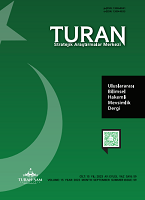MİLLİ TARİH DERSİNİN KALDIRILMASINDAKİ POLİTİK VE İDEOLOJİK ETKİLER
POLITICAL AND IDEOLOGICAL EFFECTS OF ABOLISHING THE "NATIONAL HISTORY" COURSE
Author(s): Fatih AKKUŞ, Kadir KAPLANSubject(s): Political history, Social history, School education, State/Government and Education, Sociology of Politics, Sociology of Education
Published by: Sage Yayınları
Keywords: National History; Social Studies; Politics; Ideology;
Summary/Abstract: Until the beginning of the 20th century, history formed the basis of social education. The cultural transmission centered around history, aiming to cultivate good citizens, eventually proved inadequate in achieving this goal. The reason behind this was the urbanization that began with the industrial revolution and the resulting migration from rural to urban areas. This new situation brought about changes and transformations in the social structure. The socio-economic changes in the structure of societies forced changes in education systems and curricula. In the journey towards social studies, history teaching practices in the United States have had an impact. The structure of history, which merely narrates political events and is tied to chronology, hinders the complete understanding of the goals of the lesson. Therefore, a new perspective on history education was required. Additionally, during the process of modernization, the need for a new discipline oriented towards life preparation was felt at the beginning of the 20th century. In Turkey, history was taught as a separate subject in middle schools until 1973. Starting from 1973, due to the reasons mentioned above, social studies courses were introduced. After the military coup on September 12, 1980, history programs were restructured under the influence of Kemalism (Atatürk's principles) and the Turkish-Islamic synthesis. In this context, starting from 1985, the National History course was introduced in middle schools. A National History curriculum was defined, with an emphasis on Turkish history and a reduction in topics related to Greek and Roman civilizations. After the post-modern coup on February 28, another change was made, reverting to social studies and removing the National History course. This study aims to reveal the political and ideological influences during the process of removing the National History course using document analysis. The research findings show that the National History course, like the previous and subsequent social studies courses, was prepared chronologically. It was observed that Turkish history topics were given more prominence compared to previous and subsequent Social Studies programs. In Turkey, history education at the middle school level is provided within the framework of social studies and National History courses, with the fundamental goal of nurturing good citizens. It is evident that the political and ideological influences of the era had an impact on the teaching and curriculum development of these courses.
Journal: TURAN-SAM
- Issue Year: 15/2023
- Issue No: 59
- Page Range: 309-314
- Page Count: 6
- Language: Turkish

